EIF provides tailored support to the poorest countries in the world, helping them to integrate into regional and global trading systems, create jobs and increase incomes. EIF's unique approach guarantees full ownership by the least developed countries (LDC), with the majority of projects co-financed by the countries themselves.
In its first phase, the programme allocated US$200.6 million to 134 partnerships. Now in its second phase of work, EIF continues to support LDC governments and small businesses to trade, developing the kinds of jobs that improve lives and spur sustainable economic development.
Our approach
EIF works at all stages of the trade journey. The programme offers expert research and analysis that informs policy, government trade facilitation and targeted sector support based on research findings.
Research and analysis
Browse our research and analysis
Institutional support
Learn more about how to apply for institutional support
Enhancing trade sectors
Learn more about how to apply for catalytic funding


